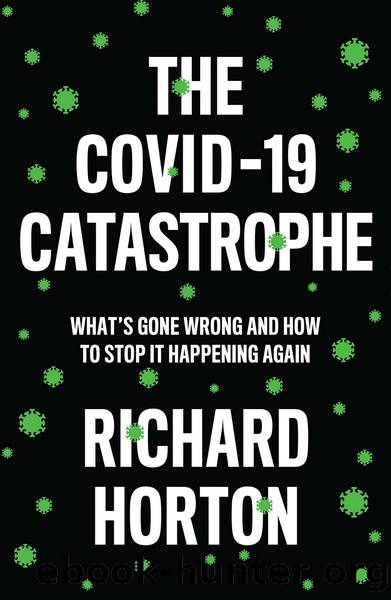The COVID-19 Catastrophe by Richard Horton

Author:Richard Horton [Horton, Richard]
Language: eng
Format: epub
ISBN: 9781509546473
Published: 2020-06-22T00:00:00+00:00
4
First Lines of Defence
An epidemic is a sudden disastrous event in the same way as a hurricane, an earthquake, or a flood. Such events reveal many facets of the societies with which they collide. The stress they cause tests social stability and cohesion.
Dorothy Porter, Health, Civilization and the State (1999)
What does it mean to possess a health service? At the very least, it represents the commitment of people living in a society (past and present) to the twin ideas of solidarity and collective action. By solidarity I mean the feelings of empathy and responsibility we all feel and owe towards one another. Solidarity stands in opposition to the principles of individualism and competition which so dominate and shape our lives in twenty-first-century capitalist, and even authoritarian, nation-states.
The existence of, public support for, and continuous development of a health system suggests that we are prepared to make personal material contributions (e.g., through taxation) to institutions that protect and strengthen the lives not only of ourselves but also of others in our society. That willingness to act on behalf of others is the second feature of a health system – our commitment to a belief in our interdependence and reciprocal responsibility towards one another and also to the collective action necessary to make those feelings real and tangible.
The whole basis of our society depends upon these two principles. COVID-19 has tested their resilience. So many people have died, so many families are in mourning, so many communities have been left scarred by disease. We have been shocked by the power of a virus to throw our societies into chaos, to deprive us of our lives and liberties, and to destroy economies. COVID-19 invites us, calls on us, requires us to rethink who we are and what we value.
One fundamental shift in our thinking surely has to be around the concept of our security. Ever since the birth of the nationstate, security has been viewed as the protection of national borders and each country’s political sovereignty. An infectious disease such as SARS-CoV-2 transcends states, borders and sovereignty. A virus is not amenable to passport controls or military defeat, despite the frequent invocation of the idea of an ‘invisible enemy’. No person, no country, can survive in splendid isolation.
COVID-19 has taught us to reimagine security as being about people and communities, about our survival, our livelihoods and our dignity. Disease is a threat to our human security, and pandemics are the most dangerous threats of all. Pandemics disrupt every part of our society, leaving us wounded and vulnerable. Protecting our security is not only about having strong military defences. Our security also depends on strong social institutions – and an effective health system is the most important defence we have to protect that security. Think of the security of your own family if you do not believe me.
The Chinese government was deeply traumatised by its experience of SARS in 2002–3. China’s leaders felt the threat a virus posed to their political model. The acceptance
Download
This site does not store any files on its server. We only index and link to content provided by other sites. Please contact the content providers to delete copyright contents if any and email us, we'll remove relevant links or contents immediately.
| Administration & Medicine Economics | Allied Health Professions |
| Basic Sciences | Dentistry |
| History | Medical Informatics |
| Medicine | Nursing |
| Pharmacology | Psychology |
| Research | Veterinary Medicine |
Good by S. Walden(3560)
The Social Psychology of Inequality by Unknown(3031)
The Checklist Manifesto by Atul Gawande(2855)
0041152001443424520 .pdf by Unknown(2846)
Get What's Yours for Medicare: Maximize Your Coverage, Minimize Your Costs by Philip Moeller(2746)
The Meaning of the Library by unknow(2573)
Guns, Germs and Steel by Diamond Jared(2372)
Borders by unknow(2316)
23:27 by H. L. Roberts(2252)
And the Band Played On by Randy Shilts(2210)
Being Mortal: Medicine and What Matters in the End by Atul Gawande(2129)
A Leg to Stand On by Oliver Sacks(2041)
The Hot Zone by Richard Preston(2020)
More Than Words (Sweet Lady Kisses) by Helen West(1867)
The Valachi Papers by Peter Maas(1861)
The Laws of Medicine by Siddhartha Mukherjee(1804)
The Andromeda Strain by Michael Crichton(1747)
Get What's Yours for Medicare by Philip Moeller(1747)
The Obesity Epidemic by Robyn Toomath(1681)
